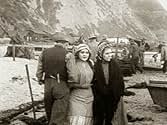Füge eine Handlung in deiner Sprache hinzuIn this story set at a seaside fishing village and inspired by a Charles Kingsley poem, a young couple's happy life is turned about by an accident. The husband, although saved from drowning,... Alles lesenIn this story set at a seaside fishing village and inspired by a Charles Kingsley poem, a young couple's happy life is turned about by an accident. The husband, although saved from drowning, loses his memory. A child is on the way, and soon a daughter is born to his wife. We watc... Alles lesenIn this story set at a seaside fishing village and inspired by a Charles Kingsley poem, a young couple's happy life is turned about by an accident. The husband, although saved from drowning, loses his memory. A child is on the way, and soon a daughter is born to his wife. We watch the passage of time, as his daughter matures and his wife ages. The daughter becomes a l... Alles lesen
- Villager
- (Nicht genannt)
- Villager
- (Nicht genannt)
- In Second Village
- (Nicht genannt)
- Villager
- (Nicht genannt)
- Villager
- (Nicht genannt)
Empfohlene Bewertungen
Years roll by Ms. Arvidson is a heartbroken woman, never knowing what happened to her husband. Their daughter (Mary Pickford, looking very grown-up) takes a husband of her own (Charles West), but mother remains alone. Then, Johnson's memory returns.
Griffith uses shots/time incredibly well - showing familiar scenes, like a static row of houses where Arvidson lives, changing over the years. "The Unchanging Sea" remains the same, but there are things happening in/on the sea which move the story. It's a lovely story, but the end is too sudden. I would have rather Griffith had the man return and never regain his memory, but fall in love with his wife all over again. The acting, direction and photography are exceptional.
******* The Unchanging Sea (5/5/10) D.W. Griffith ~ Arthur V. Johnson, Linda Arvidson, Mary Pickford
It seemed like a very Norman Rockwellian affair where the men loaded up on a boat and the women stood ashore bidding them farewell not knowing if their husbands would ever return. Hence we get the line of poetry: "For men must work and women must weep."
The Fisherman (Arthur V. Johnson) went to sea while his wife (Linda Arvidson) sorrowfully watched. He made it back, but with no memory, which made him a stranger in his own town.
Free on YouTube.
As for the story, it's based on a poem called "The Three Fishers," which is shown here during several interludes. It's a wonderful poem.
Because films were so short, you can really have time fly. Nowhere is that more evident than in this film. In a matter of a few minutes, we see years pass by a seaman leaves his family, a wreck ensues and the man survives but loses his memory. He doesn't know who is wife is and seems to be a totally lost soul. In the interim, the baby they apparently conceived before we went off to sea has now grown up. She's played by the famous Mary Pickford.
In the story, the daughter gets married and the poor wife, thinking she's now all alone in the world, gets a nice surprise when her husband returns from another voyage. His memory is back.....and all is well!
Many things happen to all of us in our lifetime, but that tide just keeps coming and going, unchanging. Nothing that profound, frankly, but that's the message. This story would have had a lot more impact had it been drawn out more, but trying to rush all of this into 14 minutes makes it way too hurried.
Key to this is Griffith's complex and daring use of cross-cutting, and in particular his narrowing the set-ups down to the minimum number of locations. The Biograph hierarchy were terrified that the story would be too confusing, but by re-using locations and camera set-ups the narrative becomes simplified and coherent. For example, when the father loses his memory and ends up separated from his family, perhaps the obvious thing would be to show him doing different things in different places as the years go by. Griffith however repeatedly shows him in that dilapidated dockyard, visually informing us that he is still stranded away from home, and still suffering from amnesia.
Griffith also saves time by having more than one thing going on each shot. In one scene we see the mother being courted by another sailor in the background, while her young daughter runs around near the sea in the background. Having two points of interest in the frame at one time shows Griffith's growing confidence in shot composition, and this is something he would gradually refine over his years with Biograph. Another important aspect is Griffith's frequent use of actors with their backs to the camera. Backs-to-the-audience is generally a no-no in theatre, but with the unlimited depth of the screen it becomes workable, and here it really adds power to the imagery.
Such was the strength of Griffith's visual storytelling, he almost did away with any need for intertitles. Here, the majority of the titles are lines from the Charles Kingsley poem upon which the picture is based. For Griffith, intertitles need not just be functional and explanatory, they could also be a kind of poetic commentary on the action.
The Unchanging Sea is a strong story told in moving pictures, although to be fair the Biograph bosses' fears were partly confirmed, because you do have to pay attention to follow it. In particular it can be a little confusing working out who is who. Griffith still had a fair way to go in developing characterisation and making individuals memorable, and this fact really stands out here.
Wusstest du schon
- VerbindungenEdited into Spisok korabley (2008)
Top-Auswahl
Details
- Laufzeit14 Minuten
- Farbe
- Sound-Mix
- Seitenverhältnis
- 1.33 : 1
Zu dieser Seite beitragen























